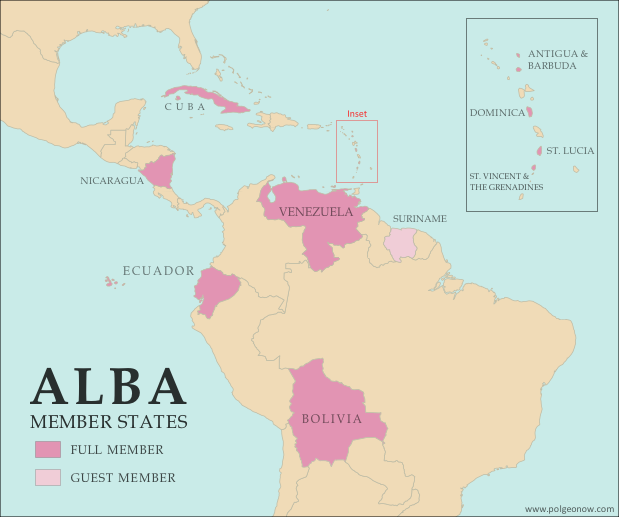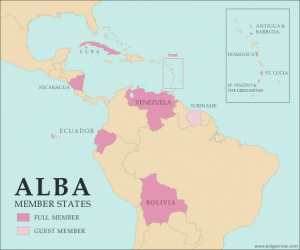
What ALBA nations told the WTO
(Joint communiqué to the Ninth WTO ministerial conference from Antigua & Barbuda, Bolivia, Cuba, Dominica, Nicaragua, Saint Vincent & the Grenadines, Saint Lucia, and Venezuela, members of the Bolivarian Alliance for the Peoples of Our America.)
One of our main core beliefs is that trade must be one of the instruments that ensures the well-being of our peoples. Consequently, we demand the signing of fair and balanced Agreements.
We believe that the Ministerial Conference is a great opportunity to start to address the asymmetries in world trade and ensure a fairer participation of the developing countries in the international trade.
The need for compliance with judgments issued by the WTO Dispute Settlement Body by members, especially when the Injured Party is a small vulnerable economy
and the Offending Party is a developed country, must be addressed in an effort to maintain the integrity of the World Trade Organization and its respective organs.
We wish to reaffirm our view that the Doha Round negotiations provide the necessary conditions for trade to be an instrument for social change, not only to create wealth, but also to distribute it equitably. Trade should be an instrument that goes beyond the human being as a potential consumer, cares for Mother Earth and points to the need to bring an end to the unsustainable patterns of consumption and production that characterize todayís world economy.
We are convinced that the Doha Work Program must be kept as the WTO core agenda, and the lack of result in the Doha agenda does not mean that it reflects an obsolete agenda, like some claim, but rather the negative of the main developed countries to take on new commitments which would revert, somehow, the negative effects of the Uruguay round on developing countries.
We are firmly committed in defending multilateralism and we reject the excuse of developed countries to promote plurilateral approaches to achieve their interests, diminishing the policy space of the countries of the south, through the establishment of new disciplines with higher standards and in detriment of the WTO and the unity of developing countries.
We are resolved in rejecting non-transparent and non-inclusive negotiating mechanisms, in order to impose unbalanced outcomes, in detriment of developing countries.
We emphasize that the agricultural matters, especially the matter related to the trade-distorting subsidies should be resolved according to the guidelines clearly set out in the Doha Ministerial Declaration, on the basis of which particular needs and concerns of the developing and least developed countries must be addressed with priority.
Being committed to our peoples, the Member States of the Bolivarian Alliance for the Peoples of Our America stand in defense of our industrial sectors and jobs, which must not be compromised by new abusive grants in the framework of the Ninth WTO Ministerial Conference.
We believe this is a great time to rethink the multilateral trading system on the basis of concepts such as solidarity, complementarity and fair trade.
We urge all the peoples of the world to mobilize in order to reach a true dimension of development and bring an end to the existing world economic order which affect the multilateral trading system and place it to the service of shabby interests.
WHAT CUBA SAID TO THE WTO
(Excerpts from statement to the WTO conference in Bali by Cuba’s Vice Minister for Foreign Trade and Foreign Investment, Ileana Bárbara Núñez Mordoche. This is a transcript of the simultaneous interpretation.)
For the past 50 years, Cuba has suffered a trade and financial embargo imposed by the government of the United States, which is the largest violation of the principles and standards of the multinational trading system in history.
It is inconceivable that the champion of trade liberalization also is failing to implement the rulings and resolutions of the [WTO’s] Dispute Settlement body. As a result, Cuba wishes to reaffirm it commitment and defense of multilateralism, and calls upon developing countries to reject the plurilateral approach, in view of the alleged failure to make progress in the WTO.
There is a need to to avoid jeopardizing the states of the countries of the south through excessively high standards.

